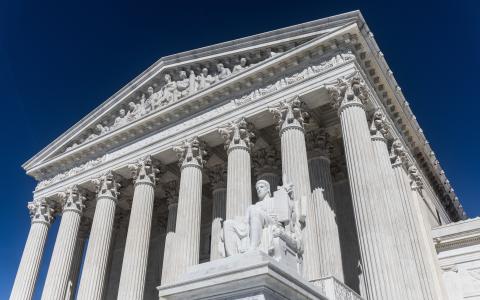
(Bloomberg) - The US Consumer Financial Protection Bureau, long a target of conservatives and the bane of the banking industry, is now in the fight of its life at the Supreme Court.
Thirteen years after a Democratic-controlled Congress created the CFPB to regulate mortgages and other consumer-finance products, the high court on Tuesday will weigh a novel constitutional argument that the bureau’s supporters say could leave it decimated.
The clash will shape the future of an agency that critics see as the ultimate symbol of an unaccountable and overreaching federal bureaucracy – but that backers including President Joe Biden’s administration say has provided crucial safeguards and an independent check against corporate power in the years since the 2008 financial crisis.
“The CFPB is under attack because it’s good at what it does,” Senator Elizabeth Warren, the Massachusetts Democrat who spearheaded the bureau’s creation, said last week.
The justices, who open their new term Monday, are reviewing a ruling that said the agency’s funding system violates a constitutional provision requiring a congressional appropriation for government spending. The CFPB isn’t subject to the year-to-year congressional appropriation process and instead draws as much money as it needs – up to a cap it has never hit – from the Federal Reserve. In fiscal 2022, the agency received $641.5 million in funding, short of its $734 million cap.
“It’s not about the merits of CFPB,” said Michael Pepson, a lawyer with the conservative Americans for Prosperity Foundation. “It’s about ensuring that Congress doesn’t shirk its duties by passing off its exclusive funding authority to unelected officials.”
The case comes at a time when the CFPB under Biden-appointed Director Rohit Chopra is taking an especially aggressive tack. The agency has sought to stamp out abuses in the mortgage-lending market, scrutinize the use of artificial intelligence in credit underwriting and rein in so-called junk fees, a catch-all term that include charges for bounced checks and late credit-card payments.
The bureau last year reached a $3.7 billion settlement with Wells Fargo & Co. to resolve allegations that it mistreated its customers for years by illegally repossessing cars, bungling record-keeping on payments and improperly charging fees and interest. Beyond banks, the CFPB under Biden has sought to probe “buy-now-pay-later” firms and penalize student lending servicers and credit reporting agencies.
Since the CFPB was created in 2010, its enforcement actions have returned $20.2 billion in compensation, principal reductions, canceled debts, and other relief to consumers, agency spokesperson Samuel Gilford said.
The activity is only fueling longstanding Republican complaints that the agency is too powerful. At a hearing in June, GOP Representative Andy Ogles of Tennessee told Chopra the bureau “should die a painful death.”
Mortgage Worries
Although the high court case centers on a never-enforced payday-lending rule, the impact is potentially far broader. In urging the justices to take up the case, the bureau said the ruling from the 5th US Circuit Court of Appeals cast a legal cloud over every action the agency has taken since its creation, providing an argument for re-opening even long-finalized rules and enforcement cases.
That’s a worry shared in part by the mortgage-banking industry, which filed a brief urging the court to limit any ruling against the CFPB. The bureau has issued dozens of rules affecting consumer mortgages and the industry has invested billions of dollars toward compliance, according to three trade groups led by the Mortgage Bankers Association.
A decision calling those rules into question “could set off a wave of challenges and the housing market could descend into chaos, to the detriment of all mortgage borrowers,” the groups argued.
The payday-lending trade group pressing the challenge, the Community Financial Services Association, calls those concerns overblown. Judges have a variety of tools to prevent disruption of the mortgage market, including the six-year statute of limitations that applies to CFPB rules, the group says.
“Lacking any viable legal argument, the bureau resorts to fear-mongering about significant disruption if all the CFPB’s past actions are vacated,” the trade group argued. “But the bureau grossly exaggerates the effects and implications of setting aside this rule.”
Delay Suggested
At a minimum, a decision striking down the payday-lending rule could provide a potent new argument for companies currently battling the CFPB, according to Bloomberg Intelligence analyst Elliot Stein. Navient Corp., which is fighting a complaint over its student-loan servicing practices, could have an especially strong case because it has already raised the issue in its defense, Stein said.
Some industry groups – including the US Chamber of Commerce and the American Bankers Association – have suggested the court could take the unusual step of ruling against the agency but delaying the decision’s effective date to give Congress time to set up a different funding system.
The 5th Circuit ruling marked the first time a federal appeals court had ever used the appropriations clause to strike down part of a federal statute. The Supreme Court has never interpreted the clause as a check on Congress, so far invoking it only as a limitation on the executive branch.
The case is part of a Supreme Court term that could put new constraints on federal administrative agencies. The justices are also considering restricting the use of in-house judges to handle cases at the Securities and Exchange Commission. And the court has agreed to revisit an important 1984 ruling that gives agencies latitude in interpreting ambiguous federal statutes.
The Supreme Court in 2020 gave the president broad power to fire the CFPB’s director, striking down job protections Congress had enacted. At the same time, the court stopped short of abolishing the agency altogether, as critics had sought.
The case is Consumer Financial Protection Bureau v. Community Financial Services Association, 22-448.
By Greg Stohr
With assistance from Katanga Johnson



